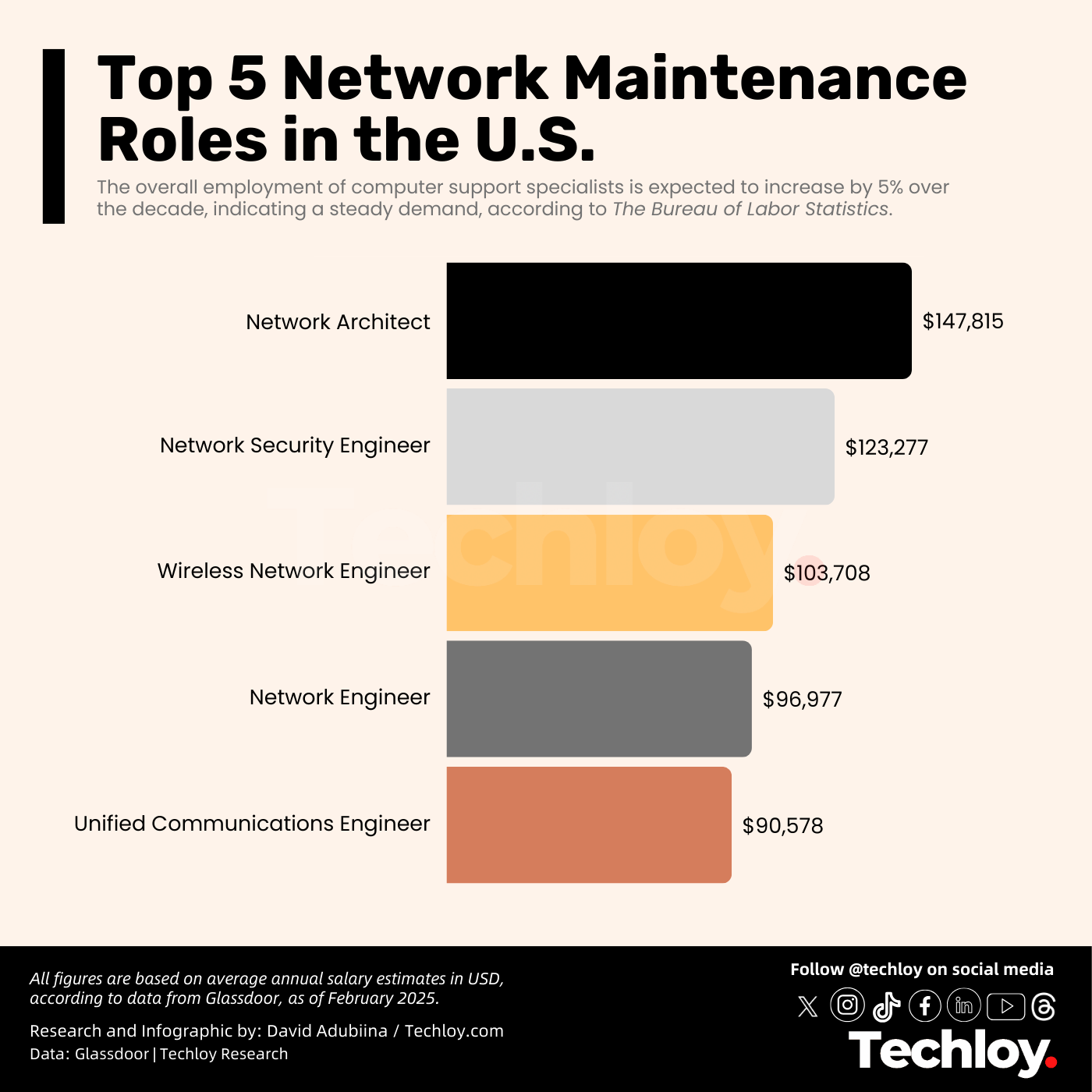Top 5 Network Maintenance Career Paths — And Their Salaries
Learn why these roles are in high demand and how they offer job security and lucrative salaries.

Looking at tech innovations, it’s easy to get caught up in the flashy stuff—faster internet, AI-powered tools, and cloud computing. But here’s the thing: none of that would be possible without a solid network infrastructure behind the scenes. More important is the network maintenance that keeps the whole tech ecosystem running smoothly by ensuring no unexpected crashes, security breaches, or frustrating downtime.
To put this simply, you can imagine walking into work one morning, ready to tackle an important presentation, only to find that your company’s entire network is down. Emails won’t send, files are inaccessible, and the video conference you scheduled with a key client is impossible to join. Productivity grinds to a halt. This is precisely why network maintenance is indispensable—it prevents these nightmare scenarios from happening in the first place.
Why is Network Maintenance Essential Today?
The digital world is growing more interconnected every day, and businesses rely heavily on their networks for everything—from communication and file sharing to security and data storage. Without proper maintenance, companies face significant risks, such as:
- Cybersecurity Threats: Hackers are always on the lookout for vulnerabilities. Regular maintenance ensures security patches, firewalls, and encryption stay updated, keeping your sensitive data safe from prying eyes.
- Costly Downtime: Every minute a network is down equals lost revenue and productivity. Proactive maintenance helps avoid sudden crashes that could bring operations to a screeching halt.
- Slow Systems: A sluggish network leads to all kinds of frustrating lags—slow-loading apps, delays in accessing files, and communication breakdowns. That’s a productivity killer.
- Unforeseen Expenses: Fixing a network after it breaks is way more expensive than just maintaining it regularly. Regular checks save businesses from expensive repairs and data recovery efforts.
- Compliance Issues: Some industries, like healthcare and finance, have strict regulations about data security. Failing to maintain your network properly can result in hefty fines or legal headaches.
With remote work, cloud storage, and online transactions becoming the norm, businesses need skilled network professionals more than ever. So, if you’re eyeing a tech career, network maintenance might be the perfect fit—great pay and job security!

5 Top Network Maintenance Roles
1. Network Architect
At the heart of every business’s digital operations is the network. The design, reliability, and security of these systems are often the work of network architects. These professionals design the digital highways that connect everything from email systems to global communications. Their job is more than just laying down the structure; it’s about creating networks that are scalable, secure, and resilient enough to meet future needs. As businesses increasingly rely on complex IT systems, the demand for skilled architects has skyrocketed. With their deep understanding of both software and hardware, network architects ensure that networks can handle growing data loads while being able to withstand potential cyber threats. Given their expertise and the critical nature of their role, network architects command impressive salaries, ranging from $150,000 to $200,000 annually, with an average salary of $147,815 per year.
2. Network Engineer
During network failures, network engineers are the first on the scene to keep systems running without interruption. Their role includes troubleshooting and fine-tuning networks to ensure efficiency and speed, which is crucial as organizations handle more data and adopt new technologies.
As businesses expand daily operations and integrate cutting-edge technology, the need for skilled network engineers continues to grow. Although it’s important to note that many factors influence salaries, such as location, job level, and years of experience, a network engineer's salary ranges from $90,000 to $130,000 per year, with an average salary of $96,977 per year. Those in high-demand sectors or with specialized skills earn even more.
3. Network Security Engineer
As technology advances, so do the tactics of cybercriminals. Every day, businesses face new threats that can cripple their operations, compromise data, and damage their reputation. To solve this continuous problem, network security engineers are needed. These professionals build firewalls, deploy encryption systems, and continuously monitor networks for vulnerabilities that could leave the door open for attackers. In a situation where a single data breach can cost millions, businesses know that a robust defense is an investment to prevent these costly disasters. With an average salary range of $123,277 per year, this role continues to be one of the highest-paying in the network maintenance field.

4. Wireless Network Engineer
If you’ve ever found yourself frustrated when your Wi-Fi cuts out in the middle of a video call or while gaming, you’ve got a wireless network engineer to thank (or blame) for that.
These experts make sure everything from office Wi-Fi to public hotspots stays up and running in an organization. With more people working from home and the rise of smart devices, reliable, high-speed internet is no longer a luxury—it's a necessity. That’s why wireless network engineers are in high demand.
Although earning capabilities may vary based on region and experience, on average, they earn $103,708 per year, with the seasoned pros or those in more specialized roles making even more.
5. Unified Communications Engineer
While collaboration tools like Zoom, Microsoft Teams, and VoIP are critical to daily operations, unified communications engineers are even more important. They are the architects who bring it all together by integrating and optimizing these technologies to ensure that teams can collaborate effectively, regardless of their physical location.
These professionals ensure that various communication systems— video calls, messaging platforms, or audio systems— work seamlessly across different devices and locations. Their role is central to modern business operations, and with companies investing heavily in communication tools, these professionals are compensated well, earning between $85,000 and $130,000 annually, with an average salary of $90,578 per year.
Conclusion
While AI and software development often steal the spotlight, network maintenance is the backbone of every digital advancement. The numbers speak for themselves—network professionals not only enjoy financial stability, with salaries reaching up to $200,000 annually, but also play a crucial role in preventing cyber threats, downtime, and costly inefficiencies.
So, if you’re seeking a career that offers job security, meaningful impact, and lucrative rewards, network maintenance is a field worth considering.







